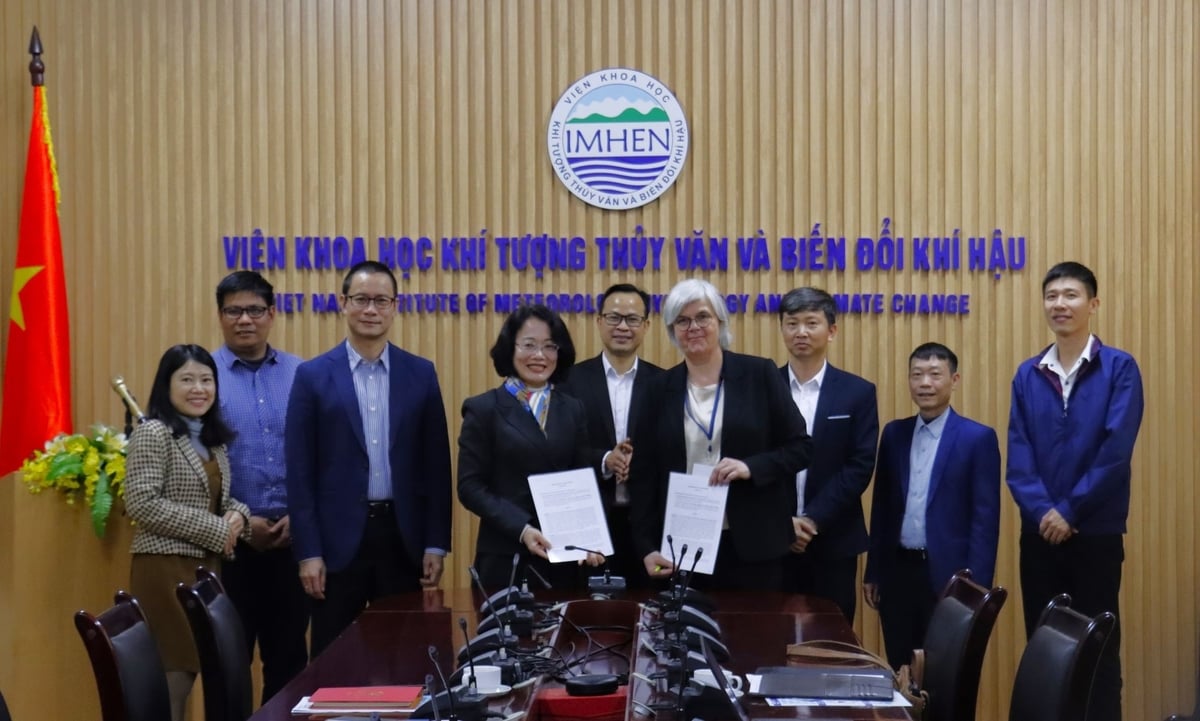May 24, 2025 | 15:23 GMT +7
May 24, 2025 | 15:23 GMT +7
Hotline: 0913.378.918
May 24, 2025 | 15:23 GMT +7
Hotline: 0913.378.918
As part of the official visit of the King and Queen of the Kingdom of Belgium to Vietnam, on March 31, the Institute of Meteorology, Hydrology, and Climate Change (Ministry of Agriculture and Environment) and the Flanders Innovation and Technology Organization (VITO) from Belgium signed and announced a Memorandum of Understanding (MOU) for cooperation between the two organizations.
The MOU will be effective from April 1, 2025, for a duration of three years, with the possibility of extension through a written agreement between the two parties.

Assoc. Prof. Dr. Pham Thi Thanh Nga, Director of the Institute of Meteorology, Hydrology and Climate Change, and Mrs. Leen Govaerts, representative of the Flanders Innovation and Technology Organization (VITO) (Belgium), exchange the Memorandum of Understanding between the two organizations. Photo: Trung Nguyen.
According to Assoc. Prof. Dr. Pham Thi Thanh Nga, the two organizations will work together on scientific research and the development of groundbreaking solutions across key areas. These include urban climate research, where they will apply high-resolution models to study urban flooding, climate risks, and develop systems for monitoring and warning about urban climate risks. Additionally, they will focus on reducing greenhouse gas emissions by developing advanced technologies for renewable energy and carbon capture that are tailored to Vietnam’s specific conditions. Another important area of collaboration will be water resource management, where they will work on building smart monitoring and forecasting systems for major river basins.
The implementation of the Vietnam-Belgium cooperation in scientific research will also bring many practical benefits. Specifically, it will involve developing high-resolution urban climate change scenarios; providing climate services to support decision-making in the face of extreme phenomena such as urban flooding, high temperatures, climate risks, and urban pollution; establishing urban climate risk monitoring and early warning systems in Vietnam; creating pilot models for smart cities and smart agriculture that are adaptive to climate change; and enhancing the capacity for disaster forecasting and early warning on a national scale. The two parties will also work on developing climate change adaptation solutions for key economic sectors such as agriculture, fisheries, and energy; applying 4.0 technologies (artificial intelligence - AI, the Internet of Things - IoT, and big data) for environmental and climate monitoring.
In terms of training, the cooperation will focus on the development of high-quality human resources through the exchange of experts and research fellows. Additionally, it will offer short-term training programs on advanced technologies and facilitate the transfer of valuable knowledge and management practices.
Ms. Leen Govaerts, Director of the Energy and Water Division at the Flanders Research and Technology Organization (VITO), emphasized that, beyond the primary areas of collaboration, both parties will remain flexible in expanding their cooperation to include new topics based on real-world needs and the strengths of each side. The Institute of Meteorology, Hydrology, and Climate Change (IMHCC) and VITO will also actively collaborate in identifying and securing international funding sources.
To ensure the success and effectiveness of their collaboration, both organizations will establish a strong working framework, maintain regular communication and information exchange, and develop specific agreements tailored to each project.
Translated by Phuong Linh

(VAN) In the tranquil wetlands of Van Long, there are quiet souls who guard the forests, nurture the waters, and oversee every bird and troop of langurs as protecting the essence of a living heritage.

(VAN) WWF, GIZ, IUCN, UNDP call for biodiversity conservation and sustainable development must be regarded as a unity in strategies for a green future.

(VAN) On celebration of International Day for Biological Diversity, Deputy Minister Nguyen Quoc Tri called for practical actions to address nature and biodiversity conservation.

(VAN) Dr. Hoang Thi Thanh Nhan – Deputy Director of the Nature and Biodiversity Conservation Agency – highlighted this on the International Day for Biological Diversity, May 22, 2025.
![Ho Chi Minh city adapts to climate change: [2] Accelerating action](https://t.ex-cdn.com/nongnghiepmoitruong.vn/608w/files/chiqk/2025/05/22/4024-4220-bien-doi-khi-hau-1-100626_766.jpg)
(VAN) Clearly recognizing the challenges posed by climate change, Ho Chi Minh city has swiftly shaped its policies and implemented practical solutions to adapt.

(VAN) Rice straw is no longer just a discarded byproduct, but it is becoming a green resource that helps farmers in the Mekong Delta reduce emissions and promote circular, sustainable agriculture.

(VAN) Other Effective Area-based Conservation Measures (OECMs) are solutions that contribute effectively to achieving the goals of the Kunming–Montreal Global Biodiversity Framework.